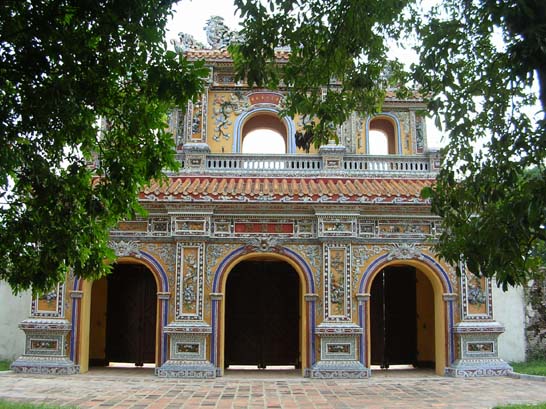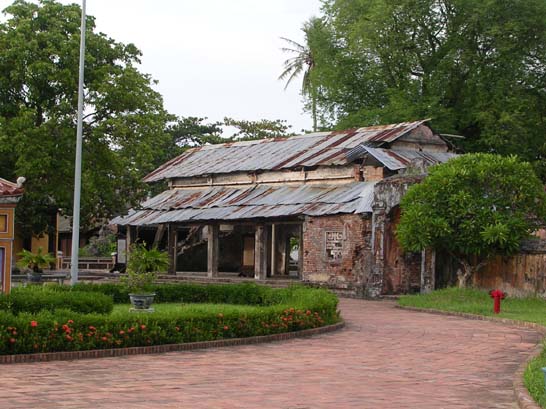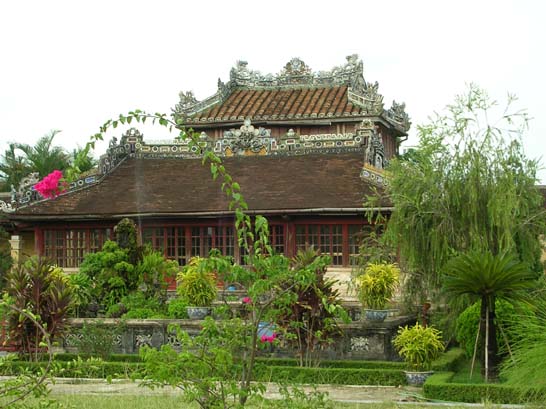Diary Entry
The capital, Hanoi, was extremely impressive. After the long train ride from there to Hue, my bones ached. We took tuk-tuks to the lovely hotel near Hue Citadel. It’s quite far from the city center, and it’s nice and quiet here. After a small breakfast, I go to another market with Glen, Jane, and the Scots. It stinks of meat, poultry, and fish lying in the sun. We quickly fight our way through the food market.
Euen and Kevin are approached by a girl who wants to give them a shave. Her small barber shop is right next door. The Scotsmen want to move on, but the girl comes up with a thousand reasons why a shave is necessary, or even a haircut if you want one.
She follows us throughout the market, gives us buying tips and price recommendations, and even haggles over a few items for us.
I buy two silk shirts embroidered with dragons and Vietnamese symbols. I haggle for half the price. Here, for the first time, I encounter beggars, children running alongside us with outstretched hands. When we’re finished at the market, the Scots give in and let the girl shave them. I wait and watch the market. It’s midday, and the young family members are providing soup and rice to their parents and relatives manning the fort at the stall.


We cross the “Perfume River”, named after the fragrant plants along its banks, and enter the city center. Although it was once the most important city in the empire, Hue is now just a small town. A Vietnamese man approaches us, explaining that his son is learning English and that he himself would like to practice his English and learn a bit about our countries. He is quite impressed when we tell him that we come from England, Scotland, Australia, New Zealand, and Germany. We cross the street into something that vaguely resembles a restaurant. At least there are a few chairs and tables in this open space.
We just get a couple of bottles of water while our friend talks like a waterfall and orders a beer. Since it’s lunchtime, I’m starting to get hungry, so I order some fried noodles. I don’t even want to look into the kitchen, because the whole place looks a bit suspect and doesn’t meet any hygiene standards. But the noodles are superb. They’re crispy fried and in a good sauce. I use chopsticks to fight my way through a huge plate.
The Perfume River of Hue
The Perfume River, known in Vietnamese as Sông Huong or Huong Giang (Hán Tu: 香江), is a scenic and historically significant river flowing through the city of Hue in central Vietnam. Approximately 30 kilometers long, it originates from two headwaters—Ta Trach and Huu Trach—in the Truong Son Mountains and eventually empties into the Tam Giang Lagoon and the South China Sea.
The poetic name “Perfume River” has several origin legends. One of the most famous states that in spring, fragrant blossoms and pollen from orchards and plants along the river fell into the water, spreading a sweet fragrance as they floated.
Another theory points to the transport of fragrant precious woods across the river, which could also have contributed to the name.
The presence of fragrant grass (Acorus) along the source streams is also cited as an explanation.
The Perfume River is not only a natural wonder but also a cultural symbol. It flows past imperial tombs, pagodas like the famous Thien Mu Pagoda, and through the historic Citadel of Hue. The river has inspired numerous poems and songs, including the well-known “Ai ra xu Hue,” which celebrates the longing for the city and its river.
Source: Wikipedia, Localvietnam, Horizont-Vietnamreisen, Copilot
We have a lot of fun with the Vietnamese guy. However, at three o’clock we have to meet up with the rest of the group again to visit the Citadel and the Imperial Palace of Hue. Our new guide for Hue seems like a crazy teenager to me. He’s totally hyper and giggling all the time. And he’s only 30.
We first take another cyclo tour around the citadel to see the city walls and towers, as well as the residents who cultivate small fields of lettuce and vegetables here. We walk over the walls, which are still riddled with bullet holes. Every now and then, you can still see whole projectiles or shrapnel embedded in the wall.
From a gate that’s as overgrown with weeds as the walls, we have a magnificent view of the old imperial city. It’s truly a quiet little town, surrounded by the coast and the mountains.
The cyclo drivers drop us off between the old citadel and the red flag square. We say goodbye to our drivers and explore the citadel. It has three gates: two for the king’s troops, and the one in the middle for the king himself, as our very prepubescent-looking guide explains. He’s not gay, he explains, but he says he has a family. Apparently, he has to mention that.



The history of the former imperial city of Hue
Hue, located on the Perfume River in central Vietnam, has been the country’s political, cultural, and spiritual center for centuries. Its history is closely linked to the Nguyen Dynasty, the last Vietnamese imperial dynasty.
In 1802, Hue became the capital of Vietnam when Emperor Gia Long founded the Nguyen Dynasty. He built the imposing Imperial City (Citadel)—a massive complex of palaces, temples, and administrative buildings inspired by the Forbidden City in Beijing.
Hue remained the capital of the empire until 1945. In that year, the last emperor, Bao Dai, abdicated and the monarchy was abolished.
During the French colonial period and later in the Vietnam War, the city suffered severe destruction, particularly during the Tet Offensive in 1968, when many historic buildings were damaged or destroyed.
Despite these losses, Hue remains a symbol of Vietnam’s cultural heritage today. The Imperial City and the Imperial Tombs south of the city have been a UNESCO World Heritage Site since 1993. Thanks to extensive restoration work, many buildings shine in new splendor.
Hue is now considered a city of poetry, music and spirituality – a place where the past has remained alive.
Source: Asian-Lifestyle, Copilot
The citadel is quite dilapidated, but still boasts beautiful colors and paintings. Within the walls lie the royal family’s palaces and the library. Everything is surrounded by beautiful parks.
But between the walls, you can also see bullet holes. In a meadow, I quickly see the tip of a snake disappear. Besides cobras, there aren’t many snakes here.
We meet in the evening at an Indian restaurant in downtown Hue. The small-town atmosphere is also enhanced by the fact that the traffic here isn’t as grueling as on longer journeys or in the big cities.
The Indian restaurant is a beautiful little place. Lady Jane, as I’ve nicknamed her because of her ladylike appearance, and I order the extra-large menu, which offers a little bit of almost everything. This comes with rum and coke, which is very cheap here. To celebrate, I wear one of my purchased silk shirts. It’s black, decorated with sewn-on red and gold symbols and a dragon.
Not only do I like it, but to my pride, it also draws the admiration of everyone else. While we’re eating, a man wanders through the restaurant, handing out business cards for his Belgian bar.
We give it a try and are lured by the offer of free pool and card games. It’s already 8:00 p.m., which is the middle of the night for Asians.
Check out more of my juvenile trip through Indochina!
The bar is completely deserted. We all order beer or cocktails and play some pool. Glen and I lose miserably to Euen and Kevin, although my botched shots seem to be more of a curse. Later, I play a few mixed games with Kevin and the girls, where things only moderately improve. Everyone except Kevin, Lady Jane, Becks (as Rebekka has now been renamed), and me disappear by 10:30.
By the way, I got the name Sandy from the Scots, which is the name for Alex in their dialect. The Aussies still call me Alec.
Shortly after eleven, Becks and I take two cyclos, which leisurely cycle us to the hotel at night. The night is warm, with only a warm breeze blowing through the deserted streets. The walls and gates are spooky, with only the occasional rat hopping across the street.
I learn more and more about Viet Nam. I am very impressed by the next destination of Hoi An and its Hinterland.










